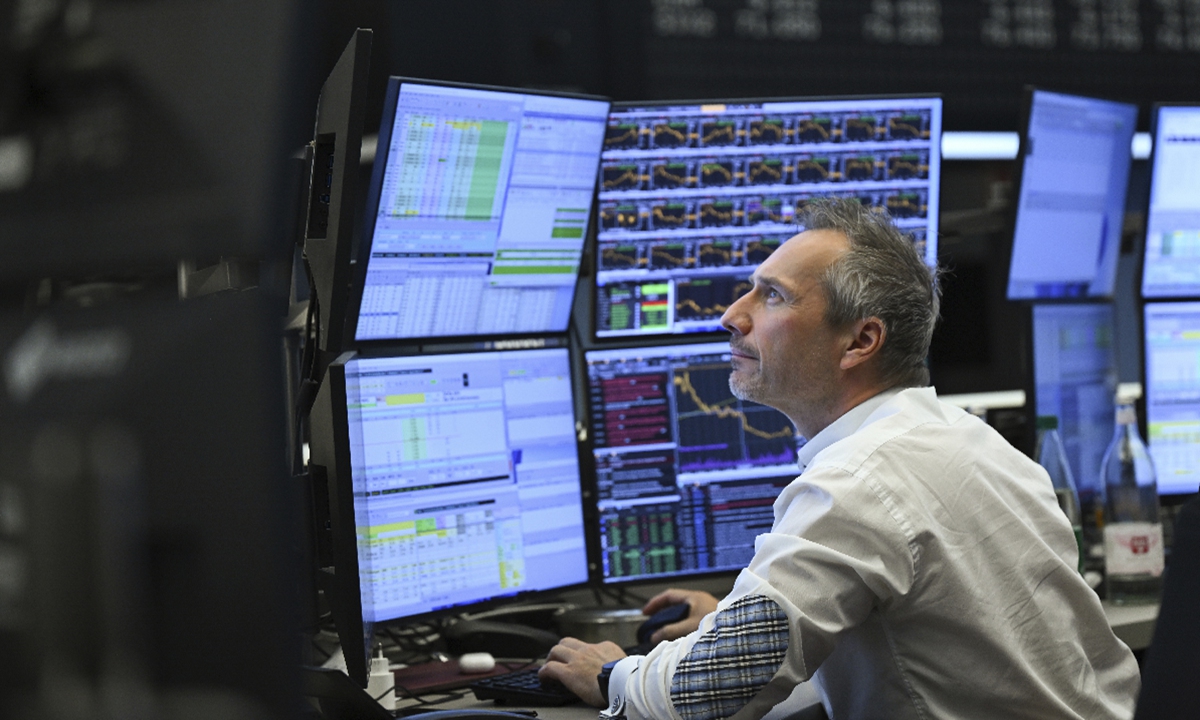
A trader watches monitors on the trading floor of the Frankfurt Stock Exchange on April 10, 2025. Photo: VCG
The latest tariff move taken by the US government is expected to significantly affect the country's consumer price levels. Tariff rates on imports from China have reached 145 percent, impacting a wide range of essential goods that American consumers rely on daily and adding to their financial burden.
Although the US has announced a 90-day pause on reciprocal tariffs except those imposed on China, if subsequent negotiations between the US and other countries do not yield any progress, the backlash effect of the US' imposing high tariffs will be strong, which could rapidly ripple through to the US economy and cause many economic difficulties for the country.
These tariffs are causing several negative effects on American consumers, including a rising cost of living, deeply undermined consumer confidence, and asset depreciation that will dent their purchasing power.
First, there is the rising cost of living. Following the increase in the import tariffs, the prices of imported goods to the US will rise, and the businesses will pass the costs to American consumers. For example, the prices of electronic products, automobiles, and auto parts are expected to surge rapidly.
Recently, panic buying has surged in the US, particularly for items like smartphones, driven by market concerns about possible price hikes due to the US additional tariffs.
Second, undermining consumer confidence. Following the US' imposing elevated import tariffs, the consumers have very uncertain expectations about the future, resulting in diminished shopping confidence. This lack of confidence is evident in emerging trends like panic buying and the rising prices of essential goods, underscoring the challenges confronting the US economy.
Third, asset depreciation affects American purchasing power. The domestic demand in the US largely benefits from the wealth effect brought about by the stock market. However, the recent turmoil in the US stock market has eroded household wealth, which will restrict the purchasing power of American consumers and households. Therefore, the volatility in the stock market not only directly affects the wealth of American households but may also cut into consumer demand in the US.
The US government's tariff policy has stirred uncertainty among the American public and business community, leaving them uncertain about the future. This pessimistic sentiment has eroded public confidence in the trajectory of the US economy. While the US government may view the tariff hikes as a strategic tool to coerce others, the tariffs have now caused domestic fallout, leaving many Americans anxious about the country's economic direction.
Consumer spending in the US accounts for approximately 70 percent of its GDP, highlighting the economy's heavy reliance on domestic consumption. Rising costs from the government's tariff policy threaten to weaken public demand, placing the US economy at risk of a potential recession.
Moreover, the new tariffs are likely to worsen inflation in the US. The latest inflation data indicates that inflation levels have not reached the target set by the Federal Reserve. This suggests that the elevated inflation has not been controlled yet. The new tariff hikes will further increase prices, inevitably exacerbating inflationary pressures there.
The twin risks of recession and inflation raise the specter of stagflation. Stagflation occurs when economic growth slows or enters recession while inflation continues to rise, presenting a significant challenge for the US government as it must navigate the dual issues of high inflation and economic downturn.
For any society, economic development and price stability are crucial. However, the tariff hikes initiated by the US government have led to further price increases in the US, creating many uncertainties that cloud its economy. The consumer price rise primarily impacts the middle and lower-income people in the US. Recently, protests have emerged in the US. As the economy may face greater risks in the future, more Americans will feel that their interests are being harmed. This is an issue that the US government needs to take seriously.
The author is a deputy director of the Center for American Studies at Fudan University. bizopinion@globaltimes.com.cn






